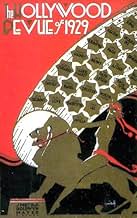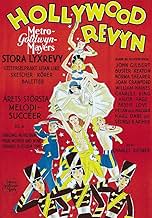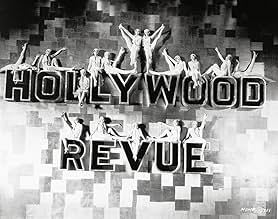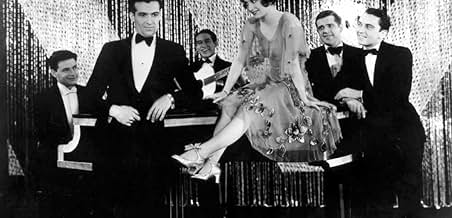IMDb RATING
5.7/10
2.3K
YOUR RATING
An all-star revue featuring MGM contract players.An all-star revue featuring MGM contract players.An all-star revue featuring MGM contract players.
- Nominated for 1 Oscar
- 1 win & 1 nomination total
Cliff Edwards
- Ukelele Ike
- (as Ukulele Ike)
Nils Asther
- Nils Asther
- (scenes deleted)
Brox Sisters
- The Brox Sisters
- (as Brox Sisters - Singing Trio)
- Directors
- Writers
- All cast & crew
- Production, box office & more at IMDbPro
Storyline
Did you know
- TriviaLon Chaney had just signed a new three picture a year deal with MGM when he was asked to do a cameo in the all-star film. Chaney agreed if it would count as one of his three contracted pictures and he would be paid his regular fee for the bit. As his salary would have eaten up most of the film's budget, the part was played by Gus Edwards with a mask and costume from London After Midnight (1927). Chaney was not happy that his name was exploited with the song, "Lon Chaney Will Get You if You Don't Watch Out." When he died in 1930, the sequence was deleted from existing prints out of respect but was later restored.
- GoofsAfter Cliff Edwards' opening number, one of the chorus girls in the background is chatting away with the girl next to her, when a sudden cut appears, and the same girl is now stone still (apparently the director told her in between to stop talking, and pay attention).
- Alternate versionsSome sources list the original running time of "Hollywood Revue of 1929" as 130 minutes. At least two sequences in the original roadshow version are missing from current prints: an opening recitation by the showgirls who are seen posing in the "Hollywood Revue" sign after the opening credits, and the appearance of Nils Asther, who assisted Jack Benny in introducing the final "Orange Blossom" number.
- ConnectionsAlternate-language version of Wir schalten um auf Hollywood (1931)
- SoundtracksSingin' in the Rain
(1929) (uncredited)
Music by Nacio Herb Brown
Lyrics by Arthur Freed
Played during the opening by The MGM Symphony Orchestra
Played on ukulele and sung by Cliff Edwards and The Brox Sisters; Danced by chorus
Sung by the major stars at the end
Featured review
This film will not get a good reception from most modern audiences, and certainly much of the film shows its seventy plus years, but this is a delight for some of us who see the '20s as a golden age, and this movie as a small window into it. It is also a humble reminder that in seventy-five years or so, what we consider entertainment will hold little or no interest to mass audiences.
If you are familiar at all with who the people are (Jack Benny, Joan Crawford, Cliff Edwards, Buster Keaton, etc.), the film is worth seeing. All of these people were one of a kind, not to be replicated by big name performers of today (great stars in their own right, but sorry, folks, they just don't have the class!). Just to see Joan Crawford as a young and beautiful woman is worth watching the film!
Technically, of course, the movie is what it says it is--a revue--intended to show audiences that their favorite silent stars can function in the new medium of sound. That purpose fulfilled (more or less), the film now might seem to have no point. The passage of time and the loss of context have made some of the humor corny (a term, by the way, from that period). The editing is clumsy (we have learned from their mistakes), but the personages themselves, and some of the song and dance, are better than anything we have today, and could not be duplicated.
I'd rather watch this than anything on the screen now.
If you are familiar at all with who the people are (Jack Benny, Joan Crawford, Cliff Edwards, Buster Keaton, etc.), the film is worth seeing. All of these people were one of a kind, not to be replicated by big name performers of today (great stars in their own right, but sorry, folks, they just don't have the class!). Just to see Joan Crawford as a young and beautiful woman is worth watching the film!
Technically, of course, the movie is what it says it is--a revue--intended to show audiences that their favorite silent stars can function in the new medium of sound. That purpose fulfilled (more or less), the film now might seem to have no point. The passage of time and the loss of context have made some of the humor corny (a term, by the way, from that period). The editing is clumsy (we have learned from their mistakes), but the personages themselves, and some of the song and dance, are better than anything we have today, and could not be duplicated.
I'd rather watch this than anything on the screen now.
Details
- Release date
- Country of origin
- Official site
- Language
- Also known as
- M-G-M Revue
- Filming locations
- Production company
- See more company credits at IMDbPro
Box office
- Gross worldwide
- $5,277,780
- Runtime2 hours 10 minutes
- Color
Contribute to this page
Suggest an edit or add missing content

Top Gap
By what name was The Hollywood Revue of 1929 (1929) officially released in India in English?
Answer





































